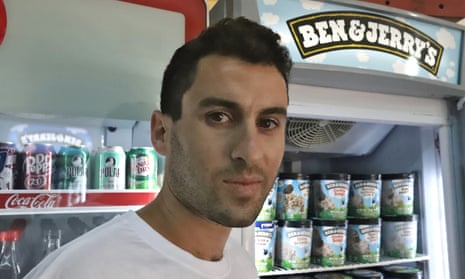There are blue skies and green grass outside and inside Pizzeria Efrat, a restaurant in a settlement of the same name in the occupied West Bank.
Outside, the pizza parlour is surrounded by lush parks and wide, quiet roads. Inside, the famous cartoon cows on tubs of Ben & Jerry’s ice-cream greet customers from no fewer than three branded freezer cabinets, stacks of red pizza boxes piled up behind them.
Ben & Jerry’s announced on Monday that it would no longer supply ice-cream to Israeli settlers in the Palestinian territories, saying that doing business there was “inconsistent with our values”. The decision is one of the highest-profile rebukes by a well-known brand of Israeli settlements built on land captured in the 1967 war, which are regarded as illegal under international law.
The boycott has dominated the news agenda in Israel this week, generating far more outcry than the Pegasus project revelations.
Israel’s president, Isaac Herzog, declared the ice-cream-maker’s decision “a new type of terrorism”, while the prime minister, Naftali Bennett, warned the chief executive of Unilever, Ben & Jerry’s parent company, that there would be “serious consequences” for the “anti-Israel” move. Many more voices in the media and political establishment have denounced the company as antisemitic.
But in the wealthy settlement of Efrat, south of Bethlehem – a transplanted slice of Americana in the middle of the Holy Land – residents did not seem particularly bothered.
“It’s a pro-Palestinian move, an anti-Israel move,” said Renay Hersh, a shopper originally from Los Angeles, outside a supermarket next to the pizzeria. “Why should we give in? It’s just ice-cream,” the 63-year-old said.
Co-founded by a New York orthodox rabbi in 1983, Efrat’s population has since grown to about 10,000 people, many of them cultural anglophones from the US, or with family ties there.
Houses here are expensive, reflecting the high demand from Jerusalem commuters seeking a suburban lifestyle on land that once belonged to four Palestinian villages. On the other side of the valley, Palestinian orchards and gardens, not connected to the Israeli water supply, are brown and dry from the summer heat.
“My dad came from New York and bought Ben & Jerry’s to Gush Etzion [a cluster of settlements including Efrat] 30 years ago,” said Asher Goodman, 29, who took over the restaurant when his father died four years ago. “It’s a big seller for us, part of the American style of the pizzeria.
“Israelis love Ben & Jerry’s. This is a national problem that is not just about Judea and Samaria [the Israeli term for the West Bank] … We will keep selling it.”
This article includes content provided by Facebook. We ask for your permission before anything is loaded, as they may be using cookies and other technologies. To view this content, click 'Allow and continue'.
The settler movement has used religion, history and security as justifications for building on Palestinian land over the past 50 years; some are also drawn for economic reasons, such as a lower cost of living and large government subsidies.
Settlers enjoy full rights as Israeli citizens, even though the state itself regards the West Bank as disputed rather than sovereign territory. And while settlers themselves are diverse in their beliefs and backgrounds, they share in common the idea that there is little difference, or none, between Jewish communities living on either side of the Green Line.
Today about 700,000 settlers live in the occupied West Bank and East Jerusalem, in what is regarded by the Palestinians and the international community as one of the major impediments to lasting peace.
“It’s been an unstoppable campaign of what is de facto annexation of Palestinian land. [Settlement-building] started a long time ago but it’s now much more vocal and they are less afraid of repercussions,” said Dr Anna Khdair, a legal researcher and advocacy officer at al-Haq, a human rights organisation based in Ramallah.
“In a way I wonder if because now it is so mainstream it actually shows more visibly what Palestinians are suffering, and that could act as a corrective. It’s important we keep talking about [sanctions and divestment from] settlements as a normal path of action rather than some radical act. The public have a right to take peaceful actions such as boycotting.”
Ben & Jerry’s is far from alone in taking a stand. Earlier this month, Norway’s largest pension fund announced it had divested assets in 16 companies that work in the occupied West Bank, including the telecom equipment giant Motorola, and the owner of the McDonald’s Israeli franchise has refused to venture into settlement communities at all.
But the ice-cream brand is likely to face a difficult battle in following through with the withdrawal when its current licensing partnership in Israel expires at the end of next year. When Airbnb took similar action in 2018, it was hit with lawsuits in the US and Israel alleging discrimination, leading the company to renege on the decision five months later.
“Being cynical, if a company says it’s no longer going to do business in the settlements, another one will show up to take its place. But Ben & Jerry’s is an interesting case because it’s so popular: this decision reaches into every household in Israel,” said Hagit Ofran, the director of the left-wing Zionist movement Peace Now’s settlement watch team.
“If some other company stopped importing bulldozers, it’s unlikely as many people would notice,” she added.
